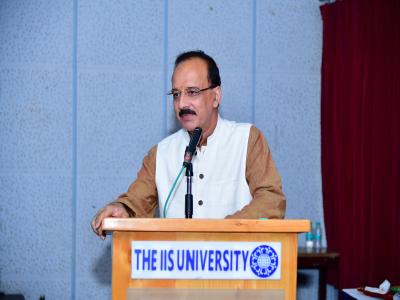Guest lecture on Learning from the Frog: GDP, Climate Change and Sustainable Living

The Department of Economics of the IIS University organized a guest lecture on 10th August, 2018 in the A.V. Hall from 1 pm onwards. The guest of honour was Shri Devinder Sharma, a renowned food policy expert and an award-winning journalist. The subject of the lecture was ‘Learning from the Frog: GDP, Climate Change and Sustainable Living’. He began with a discussion on GDP as an inappropriate measure of development and the bizarre methods used by some countries in order to increase their GDP growth figures. Then he went on to discuss climate change and environmental destruction as by-products of growth process in an economy. He also emphasized the need for economic valuation of ‘free’ natural resources. The speaker was critical of the economic models which treat farming as unproductive and disapproved of the culture of ‘socialism for corporates, capitalism for farmers’. He also touched upon the subjects of ‘quantitative easing’ and various efforts carried out by modern economists to develop comprehensive measures of development. One of the initiatives in this regard by the UN is TEEB (The Economics of Ecosystems and Biodiversity). Finally, he addressed the analogy of learning from the frog for a sustainable living. He concluded the session by advising the audience to think out-of-the-box for sustainable solutions. The audience thanked him for an inspiring and thought-provoking session.
Aditi Chaturvedi
B.Sc.(H) Sem V
A very good and factual lecture was given by Professor Devinder Sharma, a renowned food policy expert and an award winning journalist. He stated his views on the structure of ecosystem. He said that in economist’s view that is on figures basis destroying nature is a way of increasing GDP growth like cutting all the trees in country like India will raise the GDP by 27%. He also discussed about Amitabh Ghosh’s book on climate change which states that “Increase in Green house gases will raise the GDP”. He also pointed G20 (group of 20 countries) that talks only about the economic growth without taking care of nature. He laid emphasis on UN effort that is TEEP .He also pointed Mahatma Gandhi's words concerned with western culture that we should keep the doors and windows of our mind open but not let it completely damaged. He also talked about the farmers that reason behind their suicides is the loss they face. Nowadays only MSP i.e. Minimum Support Price is the way of income of farmers. Rich are getting richer and poor are becoming poorer. When the rich people donot repay loan, it becomes non performing asset while the poor is directly said defaulter and the reason is that rich will increase the GDP of the country. Pointing towards USA, he said that Quantitative Easing, that is printing 36 trillion dollars while 20 billion dollars is enough for a country. Clarifying his topic he said that Frog in well or wherever it lives never decreases the level of water by drinking it continuously. So sustainable living in a much better way is taught by Frog . Not living sustainably leads to your end. In conclusion he said that two points must be kept in mind. Firstly, try to decrease consumption level. Secondly, improve food habits i.e. try to consume more of organic food. Because increasing demand of organic produce will initiate the suppliers or producers to increase its supply. Hence in a sentence we must LEARN FROM THE FROG.
Aayushi Joshi
B.Sc.(H) Sem III

